Blood-drinking in the Bible' presents a riveting exploration of the ancient scriptures' symbolic and prohibitive references, shaping our understanding of biblical morality and divinity.

Drinkers of Blood in the Bible
Did you know that the Bible, a text revered by over 2.3 billion people worldwide, makes over 400 references to blood?
It's fascinating to explore the frequency of blood-drinking imagery found in the ancient scriptures. You'll find it's not all straightforward; the Bible's portrayal of blood drinking ranges from outright prohibition to symbolic sacraments.
So, what does this mean in a wider theological context? And how does this shape our understanding of morality, tradition, and divinity in the Bible?
Let's investigate further.
Key Takeaways
- The Bible includes many references to blood, often prohibiting its consumption, and emphasizing its spiritual significance.
- Symbolic blood drinking, such as in Eucharistic rituals, represents themes like spiritual nourishment, eternal life, and sacred covenants.
- Controversial biblical figures like Judas and Herod are linked with blood drinking, adding complexity to their character interpretations.
- The biblical representation of blood consumption has influenced modern biblical studies, prompting nuanced interpretations and doctrinal reevaluations.
Biblical References to Blood Drinking

Diving into the depths of biblical texts, you'll find several instances where blood drinking, a complex and controversial subject, is explicitly mentioned or alluded to. It's a practice steeped in cultural taboos, yet curiously pervasive in many scriptures. Genesis 9:4, for example, prohibits the consumption of blood, highlighting the taboo nature of the act. This underscores the concept of blood purity, positioning blood as a sacred life force, not to be ingested.
Leviticus 17:10-14 further reiterates this prohibition, emphasizing the significance of blood in atonement rituals. It's here where you'll see the idea of blood purity underlined, associating the act of blood drinking with sacrilege. The New Testament, too, echoes this sentiment. Acts 15:20 advises abstaining from blood, aligning with earlier Jewish laws.
Yet, in John 6:53-56, you encounter a paradox. Jesus encourages disciples to consume his flesh and blood for eternal life. This metaphorical blood drinking is a sacrament, a stark contrast to earlier prohibitions. Deciphering these contradictions isn't simple. It demands a nuanced understanding of the cultural, symbolic, and theological weight carried by blood in biblical times.
Historical Context of Blood Consumption
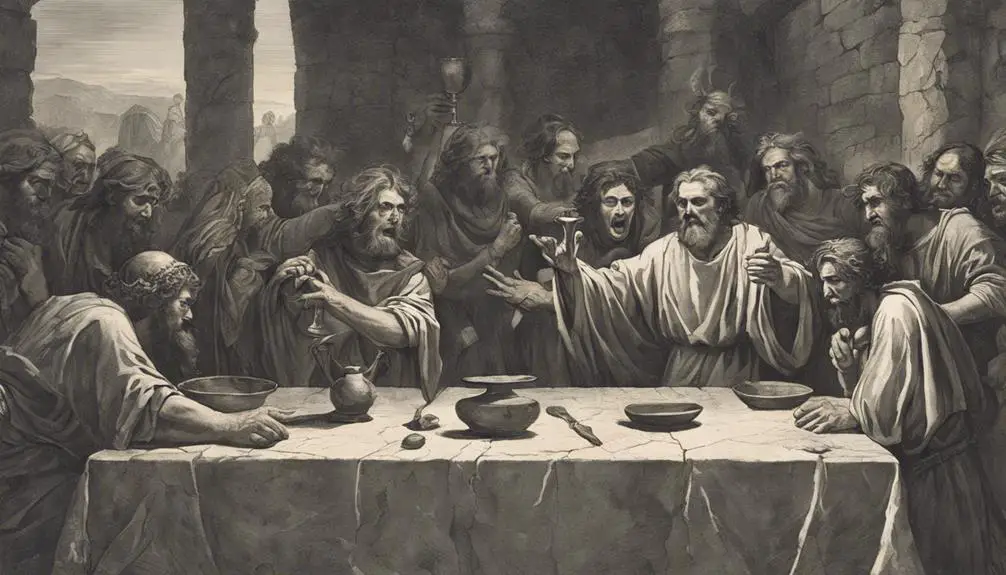
To fully grasp the biblical injunctions and contradictions concerning blood consumption, you first need to unpack the historical context surrounding this practice. In ancient times, cultural practices and dietary implications played a significant role in shaping the perceptions and attitudes towards blood consumption.
Consider the following table illustrating the historical context:
Ancient Culture |
Cultural Practices |
Dietary Implications |
|---|---|---|
Hebrews |
Blood deemed sacred |
Prohibited consumption |
Ancient Greeks |
Used in rituals |
Consumed for strength |
Romans |
Blood in sacrifices |
Used in special dishes |
Early Christians |
Symbol of covenant |
Metaphorical in Eucharist |
For the Hebrews, blood was deemed sacred and its consumption was strictly prohibited. In contrast, the Ancient Greeks used blood in their rituals and believed consuming it gave them strength. For the Romans, blood was a common ingredient in sacrifices and was occasionally used in special dishes. Lastly, for early Christians, blood symbolized the covenant between God and man, and its 'consumption' in the Eucharist was metaphorical, not literal. Understanding these historical contexts allows you to appreciate the complexities and nuances of blood consumption in the Bible.
Symbolic Interpretations of Blood Drinking
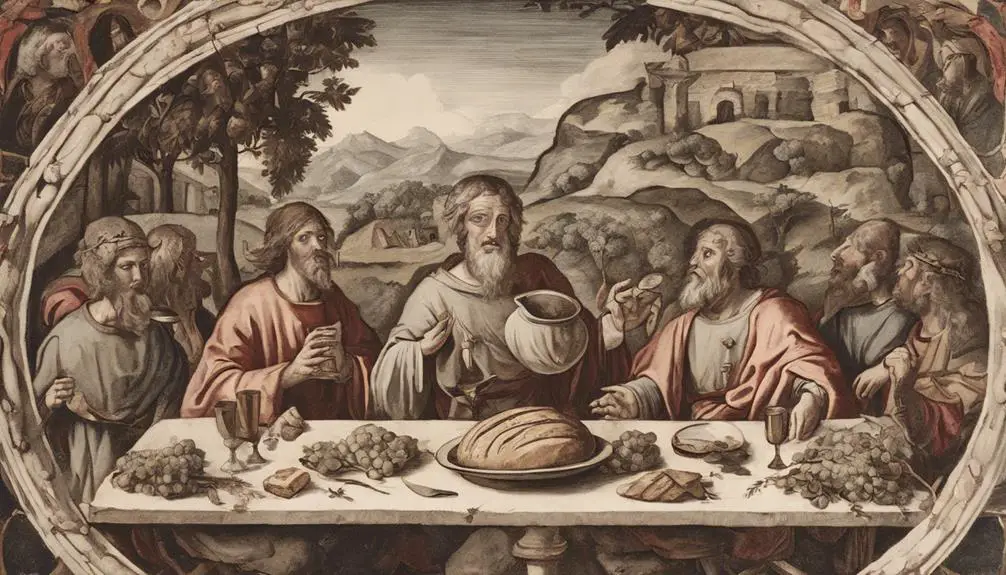
In studying the Bible, you'll find that blood drinking often carries symbolic interpretations, steeped in deep cultural and religious connotations. This ritualistic act is imbued with meanings ranging from covenant-making to life-giving processes.
Here are five examples of such symbolic interpretations:
- The consumption of blood in Eucharistic rituals represents the body and blood of Jesus Christ, symbolizing spiritual nourishment and eternal life.
- The prohibition of blood consumption in the Old Testament signifies respect for life and God's commandments.
- Blood transfusion ethics in modern times can be linked back to Biblical blood drinking prohibitions, particularly in certain sects.
- The shedding of innocent blood often symbolizes injustice, signaling a cry for divine intervention.
- Finally, blood covenants, where partaking in each other's blood signifies a binding agreement, mirror the sacredness of interpersonal relationships.
In these instances, it's clear that blood drinking isn't just a physical act; it's a conduit for profound spiritual and ethical narratives. As you continue your exploration, you'll find that these meanings deepen your understanding of the Biblical text and its relevance to contemporary issues like blood transfusion ethics.
Controversial Figures and Blood Drinking
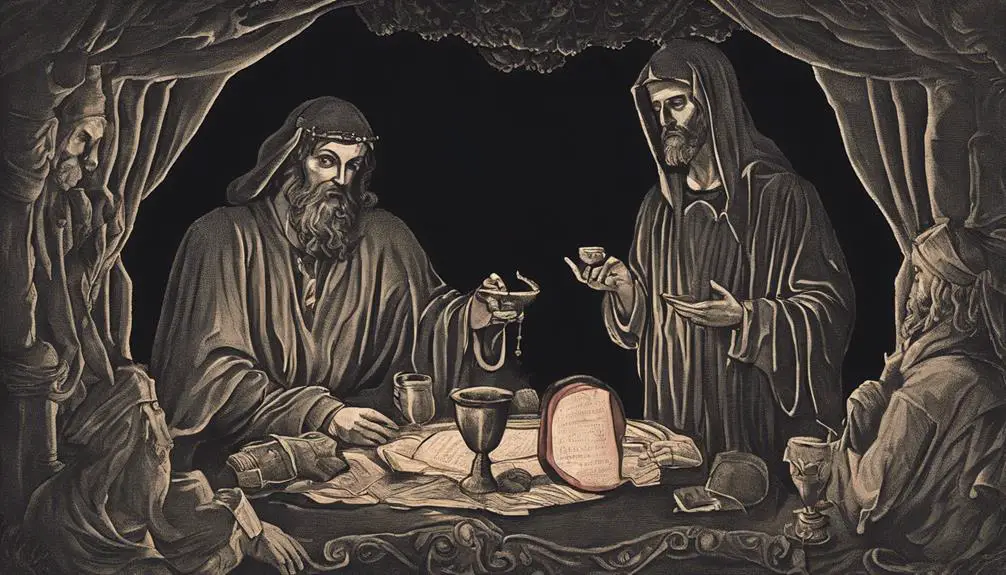
Often, you'll encounter controversial figures in the Bible associated with the act of blood drinking, adding another layer of complexity to our understanding of this symbol. This association, seen in characters like Judas and Herod, has been considered by some scholars as the origins of vampire imagery. While this is debatable, there's no denying the intrigue these figures bring to biblical narratives. They've catalyzed numerous interpretations, each contributing to the rich tapestry of this symbol's meaning.
The significance of blood rituals, particularly in the context of these controversial figures, can't be understated. The act of drinking blood, often perceived as taboo or sacrilegious, was used as a literary device to emphasize the character's deviance or spiritual corruption. In the case of Judas, for instance, his betrayal of Jesus can perhaps be seen as a metaphorical act of blood drinking, symbolizing his spiritual demise and alienation.
Impact on Modern Biblical Studies
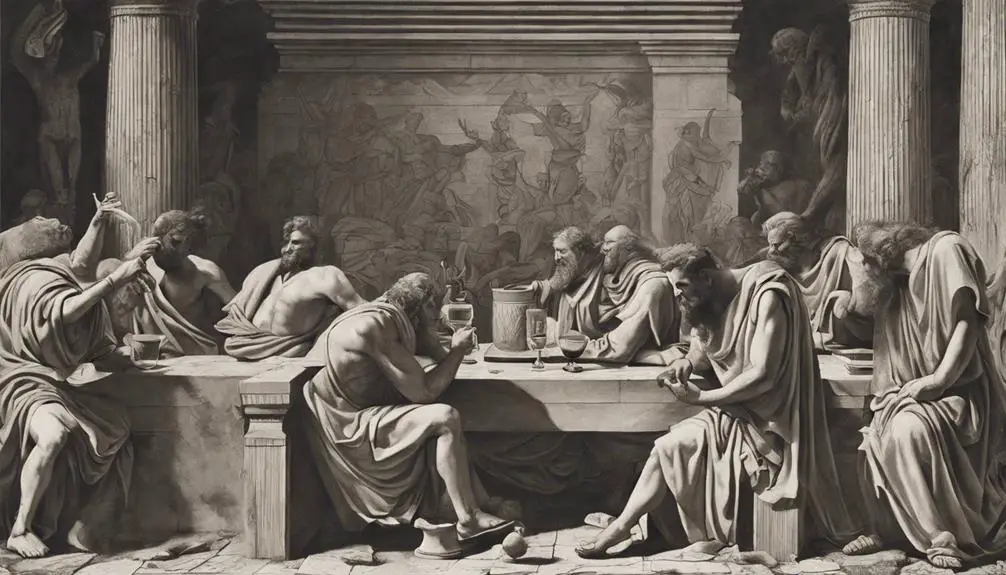
The study of blood drinking in the Bible has profoundly shaped modern biblical studies, prompting scholars to reevaluate traditional interpretations and explore new perspectives. You've likely noticed how this theme has permeated Christian interpretations, sparking intriguing discussions and debates.
Here's what this shift has meant for modern biblical studies:
- A more nuanced understanding of biblical texts, especially those related to blood drinking, has emerged.
- There's been a shift away from literal interpretations, making room for more symbolic or metaphorical readings.
- The Reformation influences have driven scholars to reexamine the role of blood in biblical narratives, and its potential implications for doctrines like atonement and sacrifice.
- This has fostered interfaith dialogues, leading to greater understanding and respect among diverse religious communities.
- Lastly, it's encouraged the application of modern literary and cultural theory to biblical studies, enriching the field by bringing in fresh perspectives.
Frequently Asked Questions
What Are the Psychological Implications for the Individuals Who Drank Blood in the Bible?
When considering the psychological implications for individuals who defied Biblical taboos, you must grasp the profound psychological symbolism involved.
These individuals, breaking stern religious norms, likely experienced fear, guilt, or even empowerment. This act could symbolize a rejection of societal norms or an assertion of personal autonomy.
However, it's crucial to remember that these interpretations are speculative, given the lack of in-depth psychological analyses in religious texts.
How Did the Practice of Blood Drinking Affect the Social Structure of Biblical Communities?
You're exploring how blood drinking taboos could've shaped biblical societies. The practice likely created divisions, with those engaging in it possibly marginalized. Biblical interpretations often cast it as sinful, further stigmatizing participants. This could've led to a hierarchical social structure, with non-participants at the top.
However, it's important to consider how interpretations and societal reactions could've varied across communities and times, and the role individual beliefs played.
What Are the Health Risks or Benefits Associated With Blood Consumption According to Modern Scientific Studies?
You're asking about the health risks or benefits of blood consumption. Modern science doesn't advocate blood consumption due to ethical and dietary implications.
Potential risks include iron overload, transmission of diseases, and allergic reactions. There's limited evidence to suggest any significant health benefits.
However, in some cultures, blood is consumed for its perceived nutritional value. It's crucial to note, these practices aren't without controversy or potential health risks.
Are There Any Existing Religious Groups Today That Still Continue the Practice of Blood Drinking?
You're asking if any religious groups continue the practice of blood drinking. While it's rare, some sects may interpret blood symbolism in their own ways, such as sacramental wine representing blood in Christianity. However, this is symbolic consumption, not literal.
It's key to note that interpretations vary widely among groups and individuals. In general, most modern religious groups don't endorse drinking actual blood due to health, ethical, and religious concerns.
How Are the Depictions of Blood Drinking in the Bible Different From the Portrayals in Popular Culture and Media?
In comparing cultural interpretations of blood drinking in popular media with biblical symbolism, you'll find significant differences.
While media often sensationalizes it, associating it with horror or vampirism, the Bible uses it metaphorically. It represents life and sacrifice, not physical consumption.
Thus, you see a stark divergence in depictions, reflecting our varied perceptions and cultural shifts over time.
Conclusion
So, you've explored the instances of blood drinking in the Bible, the historical context, and symbolic interpretations.
You've delved into the controversial figures associated and its impact on modern studies. Remember, interpretation is key.
Whether literal or symbolic, these passages continue to provoke discussion and analysis, revealing the complexity and depth of biblical texts.
Understanding them enriches your grasp of religious history and biblical narrative, sparking further inquiry and exploration.

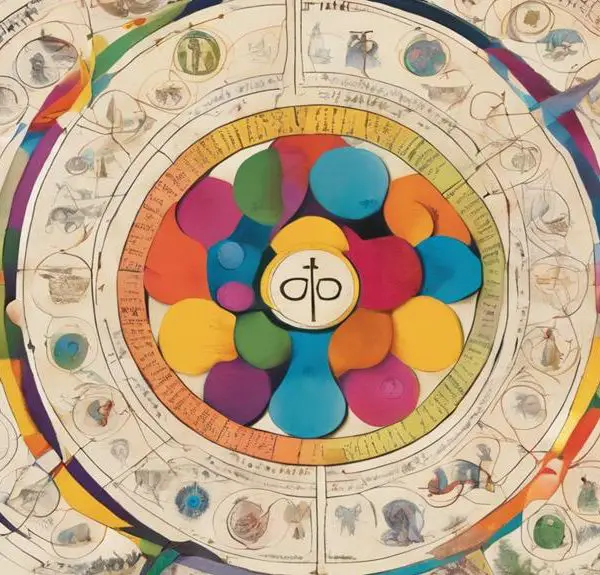

Sign up